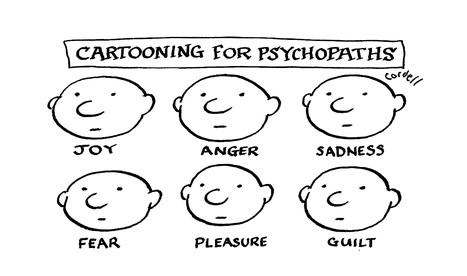Intro to Psychopaths
The appealing look with above average intelligence, balanced with the ability to stay focus and organized even in under pressure. Also, equipped with excellent communication skill that allows an individual to comfortably fit in and draw the attention of a particular crowd, these would be a perfect resume for the most wanted employee nowadays. What happens if these traits come with the catch like emotionally detached, untrustworthy, sensation-seeking, and criminally versatile? It would only set a conquest to failure for the company.
Nonetheless, the personality traits are common among psychopaths in which most people believe as the cold-blooded serial killers. While it is partially correct, these qualities are also can be found among higher level management, which can be referred to corporate psychopaths. While many would raise their concern about the presence of psychopaths stressing out the criminal proclivities, some would also believe that these individuals play a significant role in society
According to Christopher J. Patrick, Don C Fowles, and Robert F Krueger, in their research on defining the concept of psychopathy, a psychopath would exhibit a pathological syndrome of emotional detachment, impaired remorse with a deficit in emotional response and behavioral control. In addition, psychopaths only account for 1-2% of the overall population. The assessment of psychopathy in an individual can be given by employing Hare Psychopathy Checklist which consists 20 items to measure personality traits and behavior. The maximum score of the assessment is 40 and depending on the country; one can be labeled as a psychopath with a score of 25 for the United Kingdom and 30 for the United States. Although, the validity of Hare Psychopathy Checklist has been in question over the year due to the lack of evidence and valid reasoning to support the method in the assessment. It is argued that some of the criteria meet the characteristics of other psychoses.
According to Hare, the prominent feature of a psychopath is the absence of empathy, a successful development of emotional functioning ranging from the expression, recognizing, interpretation, and the response of the emotion. Which makes psychopath unable to detect empathy via verbal or non-verbal communication. In contrast, some researchers argued that psychopaths may have the capacity for cognitive empathy, allowing them to recognize and respond to the emotional from their casual encounter. However, the psychopaths would likely disregard or exploit the feeling for a personal gain. There is also evidences that psychopathy can be inherited and manifested in the early life. While genetics were responsible for a personal development, it is noted that the environmental factors have significant impacts in creating psychopaths.
Based on the criteria in Hare Psychopathy Checklist, some of the notorious serial killers like Ted Bundy, Harold Shipman, and Charles Joseph Whitman may fall under psychopath’s syndrome. Although using the same items, one can argue that not all psychopaths are violent. For example, a British journalist, John Ronson, stated while the lack of empathy is the prominent feature of a psychopath, in the right dosages, other personality traits would create a psychopath with CEO quality that can run a worldwide company. Although, it would also include the individual in other professions. The great decision often requires sacrifices that may occur beyond business world including military, medical, and firefighting. It can be settled by someone who was confident, ruthless and focused under pressure. In specific, some of the attributes such as the need for stimulation when combined with high determination, while under pressure, would bring profession like surgeon or firefighter into a successful path. Another example of positive traits of psychopathy that can be found in some profession is a higher military position. Despite the contradiction of wreaking havoc at enemy’s line, a decisiveness upon decision is needed to protect thousands of lives while keeping the enemy at bay.
In conclusion, it is worth noting that the emerging role of a psychopath, either positive or negative, run concurrently. Exploring the world of psychopathy is necessary to unveil the adaptive nature and the purpose of a psychopath in reality. The result may be beneficial in changing the perception in viewing the individual with empathy impairments and to the extent of the contribution on society as a whole.
